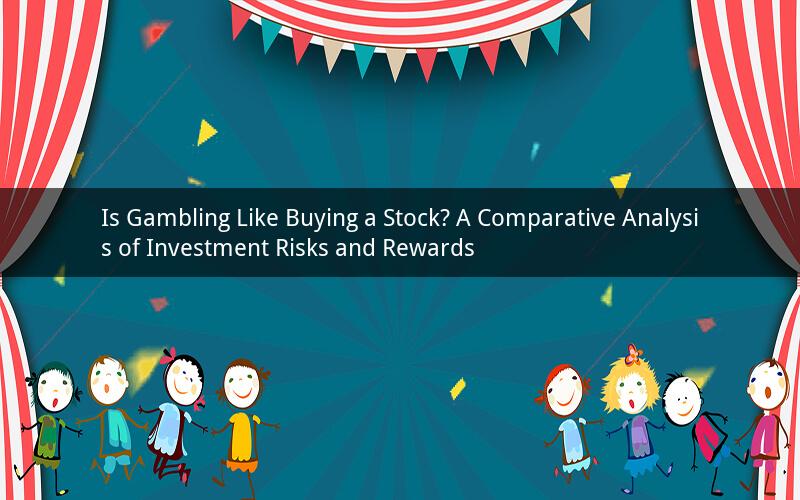
Introduction:
Gambling and stock buying are two popular activities that involve financial risk and potential rewards. While they may seem similar on the surface, there are significant differences between the two. This article aims to explore the similarities and differences between gambling and buying stocks, shedding light on the underlying principles that govern each.
1. The Nature of Risk and Reward:
Gambling and stock buying both involve risk and reward. In gambling, the outcome is uncertain, and the potential reward is directly proportional to the amount of money wagered. Similarly, buying stocks involves uncertainty, as the value of stocks can fluctuate significantly. However, the nature of risk and reward differs in each case.
In gambling, the risk is relatively straightforward. The odds of winning are predetermined, and the potential reward is known. For example, when playing a game of chance like roulette, the odds of winning a bet on red or black are 47.37%. In this scenario, the risk is the possibility of losing the entire amount wagered.
On the other hand, stock buying involves more complex risk factors. The value of a stock can be influenced by various factors such as company performance, economic conditions, and market sentiment. While the potential reward is also significant, the risk is not as straightforward as in gambling. The value of a stock can rise or fall based on numerous unpredictable variables.
2. Timeframe and Liquidity:
Gambling is typically a short-term activity, with the outcome determined quickly. For example, a slot machine game or a round of poker can last only a few minutes. In contrast, stock buying is a long-term investment strategy, requiring patience and a long-term perspective.
The timeframe for gambling is relatively short, making it more suitable for individuals seeking instant gratification. However, this short-term nature also increases the risk of impulsive decisions and financial loss. In contrast, stock buying allows investors to benefit from long-term growth and compounding returns.
Liquidity is another critical factor to consider. Gambling involves instant payouts, making it highly liquid. In contrast, stocks can be less liquid, especially when it comes to selling large positions. This liquidity difference can impact the ability to exit a position quickly, which is an essential aspect of managing risk in stock buying.
3. Knowledge and Skill:
Gambling is often considered a game of chance, where skill plays a minor role. While some games, such as poker, require strategic thinking and skill, the outcome is still influenced by luck. In contrast, stock buying requires a certain level of knowledge and skill to make informed decisions.
Investing in stocks involves analyzing financial statements, understanding market trends, and evaluating the company's prospects. Skilled investors can use various techniques, such as technical analysis and fundamental analysis, to identify undervalued stocks and make profitable investments.
4. Regulatory Framework:
Gambling and stock buying are subject to different regulatory frameworks. Governments regulate gambling to ensure fair play and protect consumers. Stock exchanges and regulatory bodies, such as the Securities and Exchange Commission (SEC), enforce rules and regulations to maintain market integrity and protect investors.
The regulatory framework for gambling varies by country, with some regions allowing more freedom while others impose stricter regulations. In contrast, the stock market operates under a comprehensive regulatory framework to ensure transparency, prevent fraud, and maintain market stability.
5. Potential for Financial Gain:
Both gambling and stock buying offer the potential for financial gain. However, the potential for gain differs significantly between the two.
Gambling can lead to rapid wealth accumulation, but it also carries a high risk of financial loss. In some cases, individuals may become financially ruined due to excessive gambling. In contrast, stock buying offers the potential for steady, long-term growth. While it is possible to lose money in the stock market, skilled investors can mitigate risks and achieve substantial returns over time.
Conclusion:
In conclusion, while gambling and stock buying share certain similarities, such as the presence of risk and reward, they differ significantly in various aspects. The nature of risk, timeframe, knowledge and skill requirements, regulatory framework, and potential for financial gain all contribute to the distinct characteristics of each activity. Understanding these differences can help individuals make informed decisions and pursue their financial goals effectively.
Questions and Answers:
1. Q: Can gambling be considered a form of investment?
A: While gambling involves the potential for financial gain, it is not typically considered a form of investment. Investments are usually made with the intention of generating a return over a longer period, while gambling is often a short-term pursuit of instant gratification.
2. Q: Is it possible to make a living through gambling?
A: While some individuals have achieved financial success through gambling, it is generally not a reliable source of income. The odds of consistently winning in gambling are often stacked against the player, making it challenging to sustain a living solely through gambling.
3. Q: Can buying stocks be compared to purchasing lottery tickets?
A: Buying stocks can be compared to purchasing lottery tickets in terms of risk and potential reward. Both involve uncertainty, and the outcome is not predetermined. However, stocks offer a higher likelihood of long-term growth compared to lottery tickets, which have a very low chance of winning.
4. Q: Are there any similarities between gambling and stock trading strategies?
A: While there are some similarities between gambling and stock trading strategies, such as the need for discipline and risk management, the underlying principles differ. Stock trading strategies often involve thorough research, analysis, and a long-term perspective, while gambling strategies may be more impulsive and short-term focused.
5. Q: Can one learn to be a successful stock trader through gambling experience?
A: While some skills, such as risk management and decision-making, can be transferable from gambling to stock trading, the underlying principles of the two activities are different. Stock trading requires a deeper understanding of financial markets, company analysis, and economic factors, which may not be adequately covered through gambling experience alone.